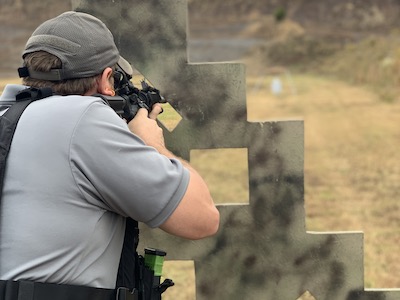
Full Day Intuitive Defensive Shooting Carbine
The Intuitive Defensive® Carbine Course is designed to expose students to an efficient method of defending themselves with a semi-automatic rifle during a dynamic critical incident. All of the principles and fundamentals of the Intuitive Defensive® Shooting program are applied to the carbine and the following topics are covered:
- Four Points of Contact with a rifle and Intuitive Shooting Fundamentals
- The Balance of Speed & Precision with a carbine
- Primary, Secondary and Tertiary Aiming Methods
- Combat Accuracy
- Volume of Fire
- Critical Incident Reloads & Efficient Carbine Handling
- Transitioning to a Pistol
- Counter Ambush Response with a Slung Rifle
- Shooting while Standing, Squatting, Kneeling & Seated
- Shooting around Cover & in Unorthodox Shooting Positions
- Fundamental Carbine Malfunction Clearing
The IDC Program is physically challenging course with a lot of activity and high round count. This program is often offered as a one day add on to a Intuitive Defensive® Shooting Course, but is also available as a two day stand alone course. Like almost all of our classes, this can be offered as a Private Training class. You can meet your instructors here.
- What do I need to bring for a 1 day carbine class?
- Defensive Carbine or Rifle
- Backup gun (optional)
- 3-5 standard capacity magazines for the carbine
- Quality sling for your carbine
- Eye and ear protection
- Weather appropriate clothing
- Gear that can withstand rigorous use. We will be spending a lot of time working with it. Think quality.
For a 1 day course Students will fire ~500 rounds of rifle ammunition - Unless otherwise noted, 1 day carbine classes do not get into transitions between carbine and pistol unless they are immediately preceded by a pistol class. Transitions may be done if time allows. IDS is based on years of constantly evolving information about how the body works and what really happens during Dynamic Critical Incidents and has been heavily influenced by the diverse group of instructors that are certified to teach it and the thousands of students who have been through courses all around the world. The program features a variety of specialty drills and training methods that the student will be able to utilize in the their own practice after the course in order to continue to develop their abilities.

